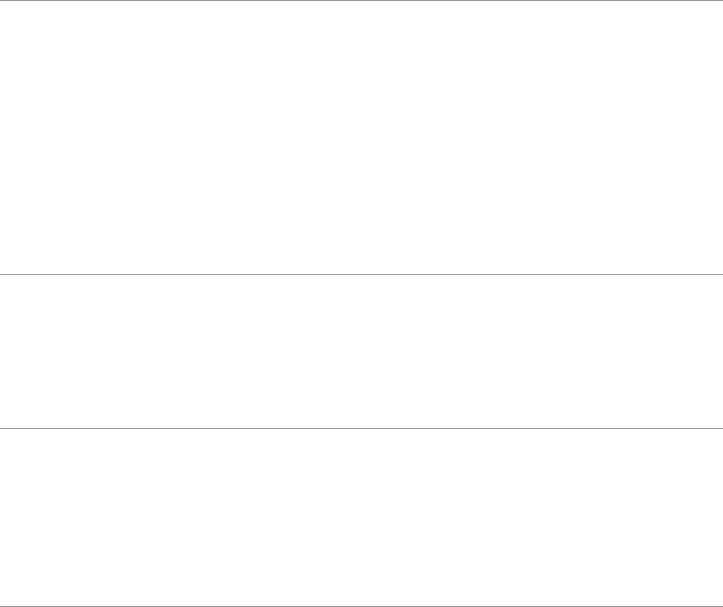Droms R. The DHCP handbook
Подождите немного. Документ загружается.


APPENDIX F DHCP Server and Operating System Versions526
Thus, if you run a Windows-only site, you have at least one compelling reason to
run the Microsoft DHCP server. If you run a Unix-only site, or a site in which you
run central computing services from Unix machines, this may be a good reason to
choose the ISC DHCP server or another DHCP server that runs on Unix.
DHCP requires that the server know on what network interface a packet arrives and
determine on what interface a packet is sent. On operating systems that cannot
provide this capability, if more than one network interface is installed, the server
cannot operate correctly.
On some operating systems, the network application programming interface (API)
that enables the server to communicate on more than one network interface at a
time requires the application to perform link-layer packet framing. The ISC DHCP
server supports link-layer framing for FDDI, ethernet, and token ring.
Table F.1 shows a list of operating systems on which the ISC DHCP server runs, as
well as network hardware and configurations it supports on each operating system.
The Microsoft DHCP server runs only on Microsoft server operating systems, such as
Windows NT Server, Windows 2000 Server, and Windows XP Server, and it supports
multiple interfaces and all the network hardware types listed in Table F.1.
TABLE F.1 Operating Systems and Network Types Supported by the ISC DHCP Server
Target Operating ISC DHCP Multiple Token
System Server Interfaces Ring FDDI Ethernet
Windows 2000 Server
NetBSD ×××××
Linux ×××××
Solaris ×× ××
MacOS X ×× ××
FreeBSD ×× ××
BSD/OS ×× ××
Tru64 Unix ×× ××
AIX ××××
HP-UX ××××
User Interface
Another difference between the ISC DHCP server and the Microsoft DHCP server is
that the ISC DHCP server is configured through a human-readable text file, which
you can edit with a text editor, with automated shell scripts, or with both. The
Microsoft DHCP server is controlled entirely through a graphical user interface
(GUI), which enables you to view and update the server configuration in a conve-
nient hierarchical format but prevents you from modifying the server configuration
with any sort of automated script.
036 3273 App F 10/3/02 5:03 PM Page 526
This can actually be a key difference between the two servers. For a simple installa-
tion, it might be best to configure the DHCP server by using a GUI. For a more
complicated installation—or for an installation in which you are trying to do things
that weren’t envisioned by the people who designed the GUI—being able to directly
modify the server configuration with a program can be a big help.
Database Formats
The Microsoft and ISC DHCP servers use different database formats. The Microsoft
database is a binary database, which only Microsoft applications can read. The data-
base format is not documented, and Windows does not include a utility to dump the
contents of the database into a human-readable form or to load data into the data-
base.
The ISC DHCP server keeps its entire database in memory for quick access, and it
stores a log of all transactions on disk. The log is a human-readable text file, and the
last entry in the file for an IP address represents the current state of the lease on that
address. This database format has some major advantages: When the database is
loaded into memory, references and updates to it are quick. Because the on-disk log
is stored in a human-readable format, and because the format is documented, it’s
easy to directly examine the database to determine the state of a particular lease.
Writing shell or Perl scripts to automatically modify the database is also very easy.
The disadvantage of the ISC log-structured database is that the DHCP server must
parse the entire file when it starts up before it can begin answering requests, whereas
the Microsoft DHCP server’s binary file enables it to begin responding to requests
almost immediately after startup. Depending on the speed of the DHCP server
machine’s processor, it might take a site with 50,000 active leases several minutes to
load the lease database.
Support for BOOTP Clients
Some DHCP servers support only DHCP clients. For example, some versions of the
Microsoft DHCP server do not support BOOTP clients. For sites that still have BOOTP
clients deployed and want to serve both DHCP and BOOTP clients, using the same
server, the ISC DHCP server or a recent version of the Microsoft server are good
choices.
Serving both BOOTP and DHCP from the same server makes sense because BOOTP
and DHCP use UDP port 67 and share the same relay agent infrastructure. If you
want to use different BOOTP and DHCP server software, you must run BOOTP and
DHCP on two separate server machines. Also, DHCP/BOOTP relay agents must be
configured to send all packets to both DHCP and BOOTP servers because relay agents
generally don’t know the difference between DHCP and BOOTP packets. In addition
to generating an unwanted load on both servers, this configuration might also
double the amount of traffic the relay agent generates.
Choosing a DHCP Server 527
036 3273 App F 10/3/02 5:03 PM Page 527
ISC DHCP Server Operating System Dependencies
Because the ISC DHCP server runs on such a wide variety of operating systems, quite
a few system dependencies are specific to these operating systems, as discussed in the
following sections.
Problems with the 255.255.255.255 Broadcast Address
On almost every operating system in which the ISC DHCP distribution uses the BSD
socket API to send and receive packets on the network, a bug exists in the API that
prevents it from correctly sending packets to the 255.255.255.255 broadcast address.
Instead, the kernel uses the local subnet broadcast address. For example, on a subnet
with a subnet mask of 255.255.255.0 and a network number of 10.100.17.0, the
kernel substitutes the address 10.100.17.255 if the DHCP server specifies an IP desti-
nation address of 255.255.255.255.
This substitution of a different broadcast address is a problem because DHCP speci-
fies that when the DHCP server broadcasts a response to the DHCP client, it must
broadcast the response to the 255.255.255.255 broadcast address. Because the client
doesn’t know what network it is on, it has no way of knowing whether
10.100.17.255 is a host IP address or the broadcast address for the subnet. Many
DHCP clients ignore this, but unfortunately the Microsoft DHCP client does not. As
a result, the server receives
DHCPDISCOVER messages from the Microsoft client and
broadcasts responses, but the Microsoft client never hears the responses. The
Microsoft client continues broadcasting
DHCPDISCOVER messages until it gives up, and
as a result the client can’t use the network.
Fortunately, on most such operating systems, you can get around this problem by
installing a host route to the 255.255.255.255 address. You can also avoid this
problem in other ways, as described in the following sections, under the operating
systems on which the solutions were tried. However, if one solution does not work,
you might want to try the suggested solution for another operating system instead.
Linux Difficulties
To use the ISC DHCP distribution on Linux, you must use version 3.0 or later. In
addition, you must configure raw packet and Linux packet filter support into your
Linux kernel. If you do not, you get one of a variety of errors when you first start the
DHCP server, indicating that it can’t create a socket or bind to it. The error message
indicates that you must set
CONFIG_FILTER=y and CONFIG_PACKET=y in your Linux
kernel configuration file and rebuild the kernel.
In current versions of the kernel, you must link these capabilities into the kernel; if
you configure them as loadable modules, they are not loaded automatically. You can
force the modules to load on system startup, but it’s more reliable to just link them
into the kernel that you start up.
APPENDIX F DHCP Server and Operating System Versions528
036 3273 App F 10/3/02 5:03 PM Page 528

It is very easy to edit the kernel configuration and rebuild the kernel without actu-
ally ending up with the new kernel in the boot filesystem. Many users have gone
through this process and then concluded that the problem is not in the kernel. Every
time someone has reported this conclusion on the ISC DHCP mailing list, it has
turned out that they weren’t running the correct kernel. So if you continue to get
error messages like this, you haven’t correctly configured the kernel.
Some older versions of the Linux kernel (2.0.33 through 2.1) provide the capability
to use multiple network interfaces with the BSD socket API. This is actually preferable
to the Linux packet filter/raw packet API in many ways, but on some kernels, it is
necessary to configure a route to the broadcast address for this to work. With Linux,
the process for adding a route to the broadcast address varies, depending on the
version of the Linux
netutils package you are using. Example F.1 shows the easiest
method, which works on recent versions of
netutils.
Example F.1
% route add -host 255.255.255.255 dev eth0
If you are using more than one network interface, you must run this line for each
interface. Older versions of
netutils do not accept an address of 255.255.255.255 on
the command line because, as a signed 32-bit number, its value is -1, and that is the
same as the error code returned by the
inet_aton() function if it can’t convert the
address; therefore, the
route command assumes the address is bad. To work around
this, you can add an entry to your
/etc/hosts file for the all-ones IP address, as
shown in Example F.2.
Example F.2
255.255.255.255 all-ones
Next, you specify the hostname you used as the destination for the route command,
as shown in Example F.3.
Example F.3
% route add -host all-ones dev eth0
On some older versions of netutils, even this command doesn’t work. You can try
the command shown in Example F.4. It might work, but you should upgrade your
version of
netutils if you can.
Example F.4
% route add -net 255.255.255.0 dev eth0
ISC DHCP Server Operating System Dependencies 529
036 3273 App F 10/3/02 5:03 PM Page 529

Some versions of the Linux 2.1 kernel have a configuration parameter that you can
turn on and off to indicate whether the kernel should enable processes to act as
BOOTP agents. If this feature is not enabled, the DHCP server cannot run. If you
have trouble getting the server to work on a Linux 2.1 kernel, you might need to
enable this, as shown in Example F.5.
Example F.5
% echo 1 >/proc/sys/net/ipv4/ip_boot_agent
Versions of the Linux kernel prior to 2.0.33 do not support DHCP service on more
than one network interface. Even if you do not have more than one network inter-
face, you should upgrade your Linux kernel before running DHCP; later kernels are
known to work better with DHCP service in general.
HP-UX Difficulties
HP-UX has the broadcast address bug described earlier and can support only a single
network interface. On some versions of HP-UX, it might be possible to use the
route
commands suggested in the section on Linux. If these don’t work, another method
that is known to work on some versions of HP-UX is to modify the
/etc/rc.config.d/netconf file, as shown in Example F.6. (You must modify this to
suit your configuration; see the HP documentation for more information.)
Example F.6
INTERFACE_NAME[0]=lan0
IP_ADDRESS[0]=1.1.1.1
SUBNET_MASK[0]=255.255.255.0
BROADCAST_ADDRESS[0]=”255.255.255.255”
LANCONFIG_ARGS[0]=”ether”
DHCP_ENABLE[0]=0
Solaris Difficulties
Multiple-interface support on Solaris seems to be stable as of version 3.0. This
support uses the DLPI (Data Link Provider Interface) API, a low-level packet-driver
API. However, some problems were reported with using the DLPI API with some
network interface cards. If the DHCP server starts up with no errors but never seems
to receive any packets, you might have this problem. If you have only one network
interface, you can modify the
includes/site.h file by adding #define USE_SOCKETS,
and then type
make clean; make. The DHCP server that this builds uses the sockets
API instead of DLPI. Except for the restriction that the sockets API can be used with
only one network interface on Solaris, no known problems exist on Solaris when
using this API.
APPENDIX F DHCP Server and Operating System Versions530
036 3273 App F 10/3/02 5:03 PM Page 530

G
Glossary
Symbols and Numbers
/n Indicates a subnet mask or prefix length of n bits. See
also subnet mask.
6bone An experimental network testbed for IPv6.
A
address classes The definitions of the network
number and host identifier component of IP addresses.
Class A, B, and C addresses define unicast addresses,
Class D addresses are used for multicast, and Class E
addresses are reserved for future use.
address pool A set of IP addresses that are available for
assignment by a DHCP server to clients on a specific
network segment.
application layer The component of the TCP/IP proto-
col models that includes specific protocols used by applica-
tion programs.
ARP (Address Resolution Protocol) A protocol used
by TCP/IP hosts to resolve an IP address into a link-layer
address.
ARP cache timeout A setting that defines the lifetime
for entries in the ARP cache.
authentication In DHCP, the process of reliably identi-
fying a DHCP client or server to other DHCP participants
and of guaranteeing the integrity of DHCP messages.
automatic allocation The assignment of an IP address
with an infinite lease to a client by a DHCP server. See also
dynamic allocation, static allocation.
037 3273 App G 10/4/02 7:37 AM Page 531

APPENDIX G Glossary532
B
bootfile A file that contains additional information needed by a computer using
TCP/IP. For example, a bootfile can contain the operating system code for a computer
that has no local disk storage.
BOOTP (Bootstrap Protocol) A protocol that provides configuration informa-
tion to network devices through the network and, thus, eliminates the need for the
system administrator to manually configure each network device. BOOTP is a prede-
cessor of DHCP.
bridge A device that connects two network media so that they appear to the
attached computers as a single network segment.
broadcast A technique for delivering a network message to more than one desti-
nation. Many network technologies include the capability to broadcast a frame to all
the devices that are attached to a network segment.
broadcast flag A bit in the
flags field of a DHCP message that controls the use
of broadcast when a server or a relay agent is sending messages to a DHCP client.
C
cable modem network A networking technology that uses the coaxial cable
infrastructure used by cable TV to provide network connections to residences at
speeds up to several megabits per second.
Class A, B, and C addresses The three classes of IP addresses used for unicast
messages. See Chapter 4, “Configuring TCP/IP Stacks,” for the formats of these
addresses.
client An application, a computer, or another device that uses services provided
by other applications or computers, usually through a network.
client identifier A value chosen by a client to be used as its identifier by DHCP
servers. This value is used instead of the client’s link-layer address.
client/server model A paradigm for organizing distributed systems in which
applications contact a server to perform application-specific functions.
collision In DHCP, the use of the same client identifier by different DHCP clients.
colon-separated hexadecimal (colon hex) A textual representation of IPv6 IP
addresses in which groups of 16 bits are written in hexadecimal notation, separated
by colons. For example, 3FFE:C15:C001:F000:204:DDFF:FEBB:6642 is an IPv6 IP
address represented in colon hex notation.
037 3273 App G 10/4/02 7:37 AM Page 532
D
data link layer The component of the TCP/IP model that is responsible for deliv-
ering an IP datagram across a network segment to the next hop on the path to the
datagram’s destination.
datagram An IP protocol message.
default router (default route) A router used as the next hop to the destination
when there is no specific route in the IP routing table; some implementations specify
default routers as default route entries in the routing table.
dentist’s office Used as a shorthand or example of a small office with a local
network (origin unknown).
DHCP (Dynamic Host Configuration Protocol) A protocol that automates
the process of configuring network hosts by allowing hosts to obtain IP addresses
and configuration parameters through the network. DHCP eliminates the need for
manual configuration of hosts and manual assignment of IP addresses by network
administrators.
DHCP client A computer or another device that uses DHCP to obtain configura-
tion parameters.
DHCP client port UDP port 68, which is reserved for transmission of messages to
DHCP and BOOTP clients.
DHCP option A specific configuration parameter that is carried in the
variable-
format section of a DHCP message.
DHCP server An application program or a computer that provides configuration
parameters to DHCP clients.
DHCP server port UDP port 67, which is reserved for DHCP and BOOTP trans-
mission of messages to DHCP servers.
DHCPACK message A message that is transmitted by a DHCP server to a client to
confirm the use of the parameters requested by the client in a
DHCPREQUEST message.
DHCPDECLINE message A message that is transmitted by a DHCP client to a server
to decline an offered address because the client has determined that it is already in
use by another client.
DHCPDISCOVER message A message that is transmitted by a DHCP client to find
servers that are willing to offer an address and configuration parameters.
dhcpd.conf The configuration file that controls the operation of the ISC DHCP
server.
APPENDIX G Glossary 533
037 3273 App G 10/4/02 7:37 AM Page 533
dhcpd.leases The file in which the ISC DHCP server records information about
leases on addresses that are assigned to DHCP clients.
DHCPFORCERENEW message A message that is transmitted by a DHCP server to a
client to cause the client to send a
DHCPREQUEST message to the server. A DHCP-
FORCERENEW message is used to cause the client to request new parameters before its
current lease expires.
DHCPINFORM message A message that is used by a DHCP client that doesn’t need
an IP address to obtain other configuration parameters.
DHCPNAK
message A message that is transmitted by a DHCP server to a client to
inform the client that it cannot use the parameters requested by the client in a
DHCPREQUEST message.
DHCPOFFER message A message that is transmitted by a DHCP server in response to
DHCPDISCOVER requests to offer a client an address and configuration parameters.
DHCPRELEASE message A message that is transmitted by a DHCP client to a server
to explicitly terminate the lease on the client’s IP address prior to the expiration of
the lease.
DHCPREQUEST message A message that is used by a DHCP client to request initial
configuration parameters, to confirm the validity of an address already assigned to
the client, and to obtain an extension on the lease for an address assigned to the
client.
DHCPv6 A version of DHCP for IPv6.
DHCWG (Dynamic Host Configuration Working Group) The working
group of the IETF that is responsible for the development of DHCP.
DNS (Domain Name System) A service for translating names for Internet hosts
into IP addresses.
dotted decimal A notation for IP addresses in which each byte of the address is
written as a decimal number, separated by periods (“dots”). For example, 192.168.0.1
is an IP address represented in dotted-decimal notation.
dynamic allocation Assignment of an IP address to a DHCP client for a finite
period of time; the duration of the assignment is known as a lease. See also automatic
allocation, static allocation.
E
encapsulation The technique of carrying data within a protocol message; for
example, an IP datagram is encapsulated as the data area in an Ethernet frame.
Ethernet A network technology that carries data across a shared medium.
APPENDIX G Glossary534
037 3273 App G 10/4/02 7:37 AM Page 534
Ethernet encapsulation The specific format for transmitting an IP datagram in
an Ethernet frame. DHCP can use either Ethernet version 2 (RFC 894) or IEEE 802.3
(RFC 1042) encapsulation.
EUI-64 identifier A 64-bit unique identifier defined by IEEE. Assignment of EUI-
64 identifiers is managed by the IEEE Registration Authority.
expression In the
/etc/dhcp.conf file, a mathematical statement whose value is
derived from constants in the expression and by values extracted from the DHCP
packet, as specified in the expression. See Appendix B, “ISC DHCP Server
Configuration File Reference,” for examples of the use of expressions.
F
failover protocol A protocol used to provide synchronization between DHCP
servers that allows each server to provide service to DHCP clients if the other server
fails or becomes unreachable.
finite state machine A technique for describing the behavior of a system as a set
of states, transitions between states, and outputs.
firewall A device that is situated between an organization’s network and the
Internet that filters IP traffic to limit forwarding of unwanted IP datagrams.
fixed-format section The part of a DHCP message that has the same format in
every message. The fixed-format section is divided into several fields.
frame A packet that is transmitted across network hardware.
FTP (File Transfer Protocol) A service that includes an application-layer proto-
col for transferring files between computers.
H
hashed message authentication code A technique for generating a message
authentication code (MAC) based on a keyed message digest generator. See also MD5,
MAC.
hexadecimal A base-16 representation for integers.
host Any networked device that does not act like a router (that is, does not
forward IP datagrams).
host requirements documents (RFC 1121, RFC 1122, and RFC 1127)
Documents that provide summary and analysis of all the protocols in the TCP/IP
suite.
APPENDIX G Glossary 535
037 3273 App G 10/4/02 7:37 AM Page 535
